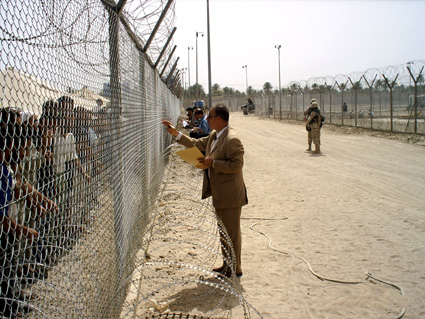|
Reviews of Recent Independent, Foreign, & Documentary Films in Theaters and DVD/Home Video
Directed by & Director of Photography: Laura Poitras. Produced by: Laura Poitras & Jocelyn Glatzer. Edited by: Erez Laufer & Laura Poitras. Music by: Kadhum Al Sahir. Released by: Zeitgeist Films. Language: In Arabic, English & Kurdish with English subtitles. Country of Origin: USA. 90 min. Not Rated.
In the current profusion of documentaries about the U.S. occupation of Iraq,
director Laura Poitras’ decision to focus on one individual is a lucid and wise one. Dr. Riyadh, the operator of a free clinic in
Baghdad, is at once a community savior who lends cash to struggling patients in addition to weekly check-ups, a family man with
six children, and a wary Sunni political candidate. The film begins on the morning of the January 2005 Iraqi national election,
with his daughters imposing a single question to their father: “Dad, are you going to vote?”
My Country, My Country then backtracks from that day to several months before the U.S.-implemented election. Combined with
Poitras’ gliding camerawork (showcasing the natural beauty of the country) and the haunting musical score of Iraqi
singer/composer Kadhum Al Sahir, such a solid narrative arc provides her film with all the virtues of a compelling drama.
However, Poitras never allows the audience – especially an American one – to distance themselves from individual families
like that of Dr. Riyadh. When a rocket explodes nearby, instead of warfare reportage, Poitras remains within his home,
capturing the reactions of his adolescent daughters. Before the election, Dr. Riyadh walks the streets of his Sunni neighborhood,
adding an encouragement to vote to his usual greetings, in spite of his friends’ skeptical views. He visits prisoners in Abu Ghraib (presumably after its scandal became known), appeasing their anger by listening to them across a fence. However, even the mild-mannered doctor throws up his arms yelling, “We are an occupied country with a puppet government. What do you expect?”
The transition of Dr. Riyadh from a faithful political candidate to one overpowered by opposition – his Iraqi Islamic Party
initiated a boycott on the election – is the film’s subliminal theme. Even still, on the morning of the vote, Dr. Riyadh persuades his
family to participate, and when his plucky teenage daughters come home showing off their purple fingers (proof that they voted), there is a hint of pride in his fatherly approval.
Poitras, who worked alone over eight months directing, shooting and operating sound in Iraq, explores the paradoxical concepts
of the military occupation and the establishment of democracy from all sides imaginable, gaining access to not only the most
personal corners of Dr. Riyadh’s home but to U.S. military briefings, as well as interviews with the Kurdish military, private
security officials, coalition members, U.N. representatives and American soldiers. Yet the more Poitras explores the more it is
evident that a sense of an impasse hovers over the entire election proceedings, as an American officer, training the Iraqi election police, encourages his men to give the world the “best show,” assuring them that, “You’re going to be in the history books!”
Marie Iida
|

